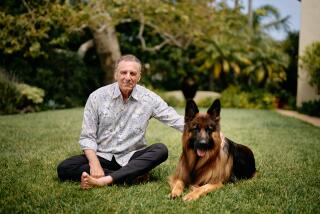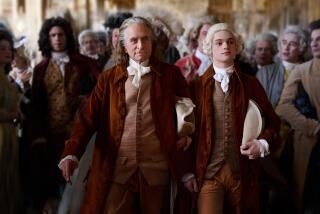Still a Classic Character
- Share via
DUBLIN, Ireland — Michael Richards is delivering a monologue on a film set, an accurate replica of an oak-paneled English Victorian living room. And everyone watching tries not even to think of the K-word. It’s Richards as you’ve never seen him before: head shaved smooth as a bowling ball, gold-rimmed glasses perched halfway down his nose. His style of dress is both shabby and genteel; he wears a Victorian frock coat over a patterned waistcoat that hides a large prosthetic paunch.
And when he opens his mouth, it’s Richards as you’ve never heard him. He speaks with a fruity English accent, in the tones of an old-style actor-manager ensuring his every word reaches the last row of the balcony.
“The jewels were stolen,” he proclaims, voice rising to a climax, “by the transcendent and immortal hypocrite and perjurer Heep in Wickfield’s house!”
He pronounces each of the words lovingly, rolling them around his tongue, and managing to elongate the word “jewels” to four syllables. (Try it yourself sometime; it’s a neat trick.)
Richards is playing Mr. Micawber in a TV miniseries adaptation of Charles Dickens’ 1849 novel “David Copperfield.” Micawber, of course, is one of Dickens’ immortal characters--full of high-flown talk but desperately impoverished, he is still a kind, gracious soul who befriends the young David. But at one point in the story his irresponsible ways with money land him in a debtors’ jail.
If playing Micawber marks a sharp left turn for Richards, it’s a deliberate one. Put simply, he is feeling typecast. And who wouldn’t, after having played one character for 9 1/2 years on “Seinfeld,” American TV’s most popular sitcom of the decade?
That character, of course, was the hyperactive oddball Cosmo Kramer--the K-word everyone on set tries not to mention. Richards, who is nearing 50, has decided he wants to distance himself from Kramer and take on a variety of acting roles. He started out as a stage actor and still recalls what attracted him to the profession in the first place--the lure of substantial, classic roles.
“I got so identified with Kramer,” said Richards in his trailer, after completing his monologue to director Peter Medak’s satisfaction. “He became a pop culture character. I really have to shed that whole ‘Seinfeld’ experience. I don’t regret having done it, it’s just that I’m so in need of stepping away from it. It was a long time.
“You become the character. That’s how people see you. At one time, everywhere I’d go, people would say, ‘Look, there’s Kramer.’ And I’d think, well, when people see Ben Kingsley they don’t go, ‘Look, there’s Gandhi.’ ”
He paused to reflect on this.
“Of course, if he’d been playing Gandhi on network TV every week. . . .”
After “Seinfeld” finally wound up last spring, Richards spent six or seven months doing virtually nothing: “I’d been cool about work after the show shut down. I’d seen other material, but nothing really took hold. And I needed to be inspired. Why work at something unless I feel like I have something worth going to?”
He planned to spend this year traveling, mostly in Europe. But then he was approached by TNT with the “David Copperfield” script and felt unable to refuse it.
“This is a fine character, and it gets me back into acting,” he said. “I haven’t been on stage for so long. Having spent so much time on ‘Seinfeld,’ I thought this way at least I could take on a new character, get into a Victorian English accent, make preparations to transform myself.”
He paused to consider.
“And after this I really do plan to take a few months traveling round Europe.”
*
The role of Micawber ironically poses problems quite different from being typecast. Richards must do his best to eradicate in the minds of viewers the memory of W.C. Fields, who made the role his own in the classic 1935 George Cukor film of “David Copperfield.”
“It’s a tough one,” he mused. “Fields was the last time I saw this character in a movie. I knew that movie. I had it at home. After I was cast, I took a bit of a glance at it, then shut it down. I wanted to approach the role as I see it.
“I guess I was afraid of being influenced. Everyone knows those cadences Fields used.” He broke into an accurate, booming Fields impression: “David Copperfield! My dear boy!”
Then he paused to reflect.
“I see more of an emotional range with this character.”
Though Richards had several big-screen offers, it’s intriguing that it took a cable TV miniseries to give him the range and depth he was looking for in a role.
“It’s two episodes of two hours each,” said producer Greg Smith, “so in four hours you’re able to explore characters and scenes much better. Dickens went into huge detail, but in this form you’re able to flesh out the story more. Dickens was a great writer about the time he lived in, and he wrote about the issues of that time--poverty, cruelty to children--as well as telling great stories.”
The production, which co-stars Sally Field as David’s Aunt Betsey and a young novice English actor Hugh Dancy in the title role, is being made for TNT by Hallmark Entertainment, which has a long track record in the miniseries form. Producer Smith, who is English, has already produced another Dickens work, “The Old Curiosity Shop,” for Hallmark. The budget for “David Copperfield” runs about $14 million and TNT may not put it on the air until Christmas 2000.
Field, too, jumped at the chance to play a Dickens character. (She was a last-minute replacement for Angela Lansbury, who had to drop out because her daughter was seriously ill.)
“The way feature films are, stories like this just don’t get made,” Field said. “And in reality this should be done at length. But you can’t do a four-hour film. The only bad news is, it ends up on a small screen. But Peter Medak has been amazing. He refuses to compromise. He won’t shoot it small.
“I also don’t know how I’d ever get to work with Michael, and see him as this character he seems born to play. I only do two scenes with him, including this one. But he has such astonishing energy.”
“What’s remarkable,” said Smith, “is that ‘David Copperfield’ is one of the best-known films of the century with W.C. Fields playing one of the best-known characters. Everyone knows how he said: ‘My dear boy.’ But Michael’s doing a remarkable job. He’s created a character completely of his own, yet totally in keeping with the book. There’s no question of emulating Fields.”
Medak, the veteran Hungarian-born director who has worked mainly in features (“The Krays,” “Romeo Is Bleeding,” “Pontiac Moon” and “The Ruling Class,” the highly regarded 1972 film with Peter O’Toole as an insane English aristocrat), agreed about Richards.
“He’s really wonderful,” Medak said during a break in filming. “I keep pushing him to go further and further. I love his outrageousness. It should be funny, this piece--sweet and sad and Dickensian.”
Those qualities were exactly why Richards wanted to do it. “What drew me to the script was the relationship between Micawber and David,” he explained. “I felt this heart and soul and kindness. It was the same reason I went after a script like ‘Unstrung Heroes,’ ” his 1995 feature, directed by Diane Keaton.
“Micawber loves to hear himself talk, he’s theatrical, he’s bigger than big. He’s another kind of unstrung hero. So in general, I look for a certain sweetness and humanity.”
Not that it’s been all harmony on the set. Greg Smith and his producing colleague John Davis have ruffled a few feathers by urging director Medak and his cast to complete scenes as swiftly as possible.
“I don’t really think of this [miniseries form] as being anything different,” said Medak, who clearly has a stubborn streak. “To me, it’s just a long movie. [The producers] would like me to be finished the day before yesterday. They say to me, ‘You’re shooting a feature film.’ I say, ‘OK, you’ve picked the wrong person then. Get rid of me.’ ” He shrugged. “It’s upsetting when you’re told what you’re doing is too good. You have to try and do something special, whatever the form.”
Field backed up her director. “They come in huffing and puffing,” she said of the producers, “and it’s ‘OK, move on, one shot, one take.’ But Peter won’t do it. And I’m supporting him.”
Richards mentioned none of this, either because he simply ignores such routine on-set tensions, or because at this point he had only been working for a few days. There’s another possible reason: He’s obviously relieved to be doing another kind of acting.
“I had no idea ‘Seinfeld’ would be so successful,” he said. “Overall, it was a remarkable experience. What a wheel of fortune! It was not easy work. It was a fine show, and we had such a good time doing it. But now it’s nice to step into a new role, have a new project with a whole new set of people. I get to feel--aaah, now I’m back.”
Though Richards first achieved national fame as a member of the ensemble troupe of the ABC sketch comedy show “Fridays” and was widely thought to be a stand-up comic, he actually started out as a stage actor.
“This isn’t my first classical role,” he said. “I’ve done Moliere’s ‘Tartuffe,’ ‘A Christmas Carol,’ ‘The Trojan Women.’ At the Mark Taper Forum, I did ‘Wild Oats.’ I only started working in nightclubs as a stand-up just to do it. But I’m an actor.”
He is also relishing being in Europe, where “Seinfeld” has made nowhere near the impact it did in America: “I was in London recently, I walked around and no one recognized me. I kind of enjoyed that.”
At this point, an assistant director called at his trailer to tell him he was needed back on the set. Richards placed his hands beneath his fake paunch and stood up. He accepted the offer of a lift from a unit driver, even though the set was only 200 yards away, and began an impromptu riff of ideas, talking out loud but half to himself.
“OK, so now I’m Micawber getting into the car,” he muttered, sliding into the passenger seat. “Surreal.” The driver started up the engine and music blasted from the car radio. “So here’s Micawber, listening to rap music!” Richards said. He glanced over his shoulder, did a jerky double take, raised those eyebrows, fidgeted and looked nervous and wide-eyed. Just like you-know-who.
It made you realize Cosmo Kramer didn’t arrive from nowhere; there’s more of him in Michael Richards than he might care to admit. He’s doing his best to consign him to the past. He doesn’t need to play only for laughs. He can even take on roles in which he can walk through a door without that trademark one-two shuffle. But Kramer may be harder to shake off than he knows just yet.
More to Read
The complete guide to home viewing
Get Screen Gab for everything about the TV shows and streaming movies everyone’s talking about.
You may occasionally receive promotional content from the Los Angeles Times.






